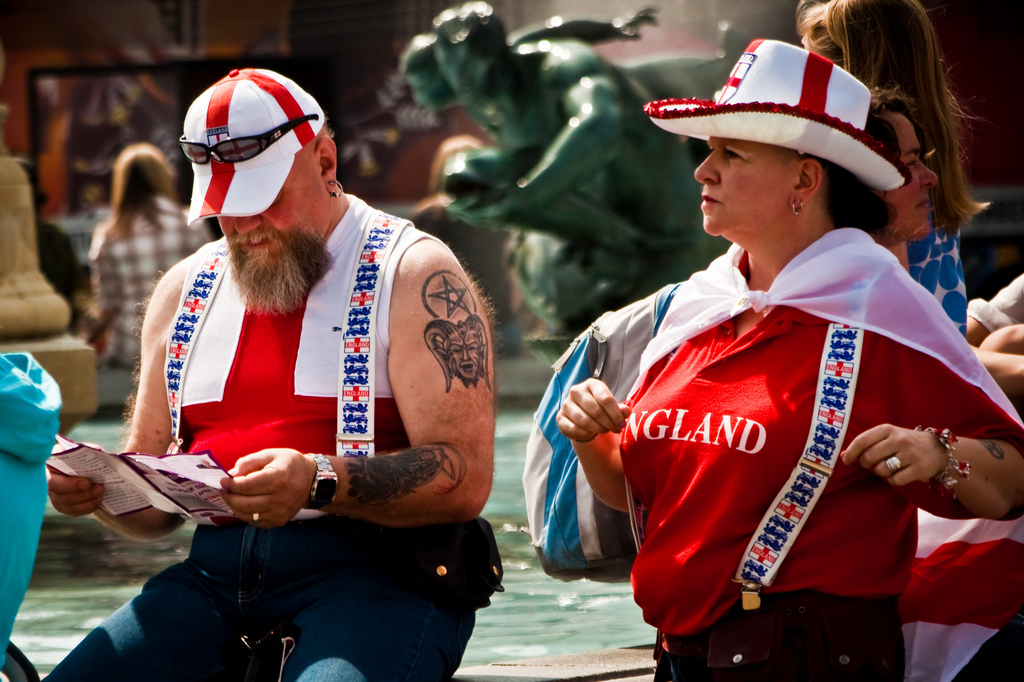(Top photo: An EDL supporter at a rally in Manchester. Photo by Chris Bethell)
According to a poll released by YouGov last month, nearly a fifth of people in the UK define themselves as English as opposed to British, up five percent from 2015. This comes in the wake of a decision to leave the European Union, driven in large part by English voters, at a time when UKIP’s new leader, Paul Nuttall, has promised his party will seek to challenge Labour by espousing this newly reawakened English nationalism. “The next big issue that’s going to come up in British politics beyond Brexit is Englishness,” he told the Telegraph.
Videos by VICE
Englishness as a standalone identity has always struggled to articulate itself. During the 20th century it was largely subsumed into Britishness. England’s cultural behemoths, from The Beatles to the Sex Pistols, emerged draped in Union Jacks rather than St George’s flags. It was Britpop and Madchester; never “the English Invasion”. Aside from a tournament once every two years, when the four nations split up to experience their own footballing disappointments, English people tend to identify themselves locally – as Cornish or Scouse, say – instead of under any kind of shared nationhood.
Britishness, meanwhile, is going from strength to strength. In recent years it’s been reborn as a brand – the cult of Keep Calm and Carry On sold to shy-Tory 20-somethings who think the Queen is “cute”. Bolstered by the 2012 Olympics, this is a cuddly, meme-friendly national identity of Very British Problems and “21 Things British People Miss When They Move To America”. This deeply privileged universe of Marmite and umbrellas has allowed Britishness a place in the new millennium, repositioning the Union Jack as a symbol of complaining about weather rather than the banner of colonisation and genocide.
Englishness was never so fortunate as to enjoy the support of Buzzfeed, so it sulked and festered on fringe Facebook groups and in dilapidated pubs, indulging in images of Knights Templar and statements of vague intent. Passion. Pride. Belief. No Surrender.
In addition, Englishness has long struggled to define itself against the competing national characters of Scotland, Wales and Northern Ireland. It’s an oft-trod line of argument among beleaguered Englanders that “Welsh people are allowed to celebrate St David’s day, but if we celebrate St George we’re told we’re racist!” While this suggestion of a discriminatory disparity is largely imagined, it is true that Northern Ireland, Wales and Scotland have all become increasingly influential political characters in their own right, leaving England gasping for meaning. Talk of parliamentary devolution has all too easily conflated England with London, and as such misunderstood Englishness as an assumed, self-confident, dominant identity – a misunderstanding that fails to appreciate the suburban stretches and satellite towns in as much need for definition as the Scottish highlands.
This struggle with the neighbouring Kingdoms is embodied nowhere better than within the ranks of the SNP. As Labour continues to prove as popular among Middle-Englanders as Gaspar Noé films, the SNP led by Nicola Sturgeon are now such a vocal presence in the House of Commons they recently bid to become the official opposition to the Conservative Party. As was demonstrated during the 2016 general election, in posters that depicted Ed Miliband in Alex Salmond’s pocket, Scotland is a rival now far more than a partner. When the SNP aren’t campaigning for their own independence, they are moving to oppose the Brexit they never voted for in the first place. They fly their flag and extol their virtues defiantly, which has sent England into an existential crisis – for if the Union falls apart, what will become of the shapeless patch of rock in the middle? Scotland has forced England to manufacture a reactionary identity of its own.

Photo by Garry Knight via Flickr
The English patriotism of 2017 doesn’t fly a flag. Instead, it complains loudly about not being allowed to fly one. It is not the sound of throats rattling in common song; rather, it’s the drone of MPs debating whether or not England should have its own national anthem. It’s the call to reinstate crowns on pint glasses. It is a national identity built on strongly worded letters of complaint and LBC phone-ins.
The New Englishness doesn’t give a shit about Bowie’s death, or Corrie, or Steve McQueen, or Glastonbury, or Daniel Day-Lewis, or Danny Dyer, or Adele, or Wiley, or Wetherspoons, or Marcus Rashford, or the NHS. It is, instead, a celebration of everything it hates, defined by all the wrong it sees. The New Englishness is a tabloid patriotism of outrage and injustice, far more comfortable working in negative space than it is in celebration. It is anti-EU, anti-political correctness, anti-Muslim, anti-Scottish independence, anti-vegan, anti-globalisation, anti-Corbyn, anti-speed limits in pedestrian areas, anti-urban development of the greenbelt, anti-gastro pubs and anti-Gary Lineker.
Tellingly, England’s newly awakened patriotism is also old. The results of Viceland’s census of 18 to 35-year-olds strongly indicated that young people don’t care about nationalism, with a quarter of respondents registering themselves as 0 out of 10 in terms of how patriotic they are. YouGov has published statistics which follow a similar model, revealing in 2015 that patriotism significantly declines with each generation. It is the old, then – the same old who drove Britain out of the European Union – who are at the beating heart of England’s new patriotic zeal. They have no interest in contemporary England; their passion comes instead from a longing for the past, and a conviction that they are somehow being censored from revelling in it. In a strange turn of events, declaring love for Queen and country has become an anti-establishment sport.
Declaring love for Queen and country has become an anti-establishment sport.
Then again, none of this should be that surprising. England’s culture has flown the nest, and its superstars have become global products. David Beckham and Adele might sound like they come from London, but their audience is international, and their brand glossy and Americanised. We have prime ministers concerned with coming across like presidents, a BBC trying its best to engender international appeal and a Premier League that more closely resembles an international real estate conglomerate than it does a football table. Globalisation has created a vacuum ready to be filled by the EDL, the Daily Express and legions of columnists, talk-show hosts, fringe politicians and other “common-sense” polemicists. They birthed a hollow, fearful national spirit based on the urge to protect England from immigration and the PC brigade.
Of course, nationhood – as the Scottish have shown – doesn’t have to be dangerous. Even if you don’t believe there is magic in the soil, or that being born an Englishman is to win the “lottery of life”, there is no harm in recognising the shared traits and ephemera of the place – revelling in the windscreen wiper rhythm of lay-by sandwiches, cheap-sounding house music, badly-fitted leisurewear and drinking in parks for weeks on end during the summer months.
Sadly, the New Englishness celebrates none of these things. It is a national pride that simply wants to be noticed – a self-aware patriotism that lionises the idea of England without ever substantiating its qualities. It is nothing but a bumper sticker, a campaign banner, a defence mechanism and a political tool.
Depressingly, we’re going to be hearing a lot more about this English patriotism over the coming years. UKIP are likely to make England’s awakening their “Make America Great Again” as they pick up seats in the forgotten corners of the nation, like nightclub crawlers preying on the broken-hearted. The Conservatives will have no problem aping this in order to stay afloat, and many Labour MPs are calling for Labour to rediscover the socialist patriotism carved out by Orwell in the 1940s. It would be a mistake to dismiss this renewed patriotic fervour as racist or backwards, but that doesn’t mean we should blindly accept this facsimile of pride as a positive thing.
If the New Englishness is the fightback of forgotten communities, then it is a national identity borne out of an inherently political place – a volksgeist of resentment – not a cultural or a spiritual one. All it can promise is the past, and there can be no hope or glory in that.
More on VICE:
America and Britain Are Being Hit by the Same ‘Whitelash’




